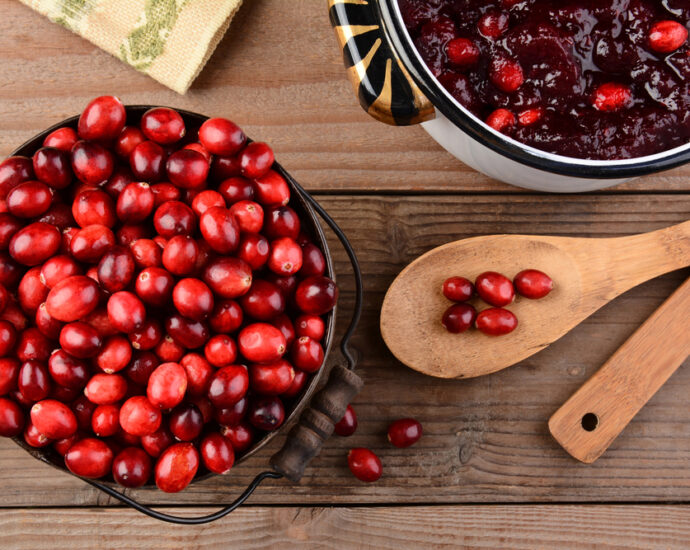Cranberries, with their vibrant hue and tangy taste, have long been celebrated as a holiday staple, often relegated to the Thanksgiving table in the form of sauces and relishes. However, beyond their festive appeal, these little red berries pack a powerful nutritional punch that can significantly benefit women’s health. From urinary tract health to heart protection and beyond, cranberries offer a plethora of wellness advantages that make them deserving of the title “superfood.”
Page Contents
Cranberry Health Benefits
Urinary Tract Health
One of the most well-known benefits of cranberries is their ability to support urinary tract health. Cranberries contain compounds called proanthocyanidins, which help prevent certain bacteria, like E. coli, from adhering to the walls of the urinary tract, thus reducing the risk of urinary tract infections (UTIs). For women, who are more prone to UTIs than men due to differences in anatomy, incorporating cranberries into their diet can be a proactive measure for maintaining urinary tract wellness.
Heart disease remains one of the leading causes of death among women worldwide. Fortunately, cranberries offer potential protection for heart health. Rich in antioxidants, such as flavonoids and polyphenols, cranberries help combat oxidative stress and inflammation, two major contributors to cardiovascular disease. Moreover, research suggests that cranberry consumption may improve various risk factors for heart disease, including high blood pressure, elevated cholesterol levels, and impaired blood vessel function.
Anti-inflammatory Properties
Inflammation lies at the root of many chronic conditions that disproportionately affect women, including arthritis, autoimmune disorders, and certain types of cancer. The anti-inflammatory properties of cranberries can help mitigate inflammation throughout the body, promoting overall wellness and potentially reducing the risk of developing these conditions. By incorporating cranberries into their diet, women may support their bodies’ natural defense mechanisms against inflammation and its associated health risks.
Antioxidants play a crucial role in neutralizing free radicals, unstable molecules that can damage cells and contribute to aging and disease development. Cranberries are loaded with antioxidants, including vitamin C, vitamin E, and various phytonutrients, making them an excellent addition to any woman’s diet for antioxidant support. By scavenging free radicals, cranberries help protect cells from oxidative damage, promoting healthier aging and reducing the risk of chronic diseases associated with oxidative stress.
Tips for Incorporating Cranberries Into Your Diet
Adding cranberries to your diet doesn’t have to be limited to cranberry sauce on special occasions. Here are some simple ways to enjoy the health benefits of cranberries year-round:
- Fresh or Frozen: Enjoy fresh or frozen cranberries in smoothies, salads, or as a topping for yogurt or oatmeal.
- Dried Cranberries: Snack on dried cranberries as a delicious and convenient way to get your daily dose of cranberry goodness.
- Cranberry Juice: Opt for unsweetened cranberry juice or cranberry juice blends as a refreshing beverage choice.
- Baked Goods: Incorporate dried cranberries into muffins, cookies, or bread for a sweet and tart flavor boost.
In conclusion, cranberries are not just a tasty addition to holiday meals; they are a nutritional powerhouse with numerous benefits for women’s wellness. Whether you’re looking to support urinary tract health, protect your heart, reduce inflammation, or boost antioxidant levels, cranberries offer a versatile and delicious way to enhance your overall health and vitality. So, next time you’re grocery shopping, be sure to stock up on these vibrant red berries and reap the many rewards they have to offer.
Nutritional Information
Cranberries are low in calories but rich in essential nutrients, making them a nutritious addition to any diet. Here’s a breakdown of the nutritional value of cranberries per 1 cup (approximately 100 grams) of raw cranberries:
- Calories: Approximately 46 calories
- Carbohydrates: Around 12 grams
- Dietary Fiber: Roughly 4 grams
- Sugar: About 4 grams
- Protein: Less than 1 gram
- Fat: Less than 1 gram
In addition to these macronutrients, cranberries are also a good source of several important micronutrients and antioxidants, including:
- Vitamin C: One cup of raw cranberries provides about 16% of the recommended daily intake of vitamin C, an essential nutrient that supports immune function, skin health, and wound healing.
- Vitamin E: Cranberries contain small amounts of vitamin E, a fat-soluble antioxidant that helps protect cells from damage caused by free radicals.
- Vitamin K: Cranberries are a modest source of vitamin K, which is important for blood clotting and bone health.
- Copper: Cranberries provide a small amount of copper, a trace mineral that plays a role in the formation of red blood cells and maintenance of connective tissues.
- Manganese: Cranberries contain manganese, a mineral involved in bone formation, metabolism, and antioxidant defense.
- Potassium: Cranberries contain a moderate amount of potassium, an electrolyte that helps regulate blood pressure, muscle contractions, and fluid balance.
Furthermore, cranberries are packed with antioxidants, including flavonoids, phenolic acids, and proanthocyanidins, which have been associated with various health benefits, such as reduced inflammation, improved heart health, and enhanced immune function.
It’s important to note that the nutritional content of cranberries can vary depending on factors such as ripeness, growing conditions, and preparation methods (fresh, frozen, dried, or juiced). Overall, incorporating cranberries into your diet can provide a range of essential nutrients and health-promoting compounds to support overall wellness.
READ MORE: Urinary Tract Infection
Sources:
https://healthsurgeon.com/nutrition/cranberries-as-a-supplement-and-source-of-antioxidants/
https://www.cdc.gov/heartdisease/women.htm
https://www.webmd.com/food-recipes/health-benefits-cranberries
